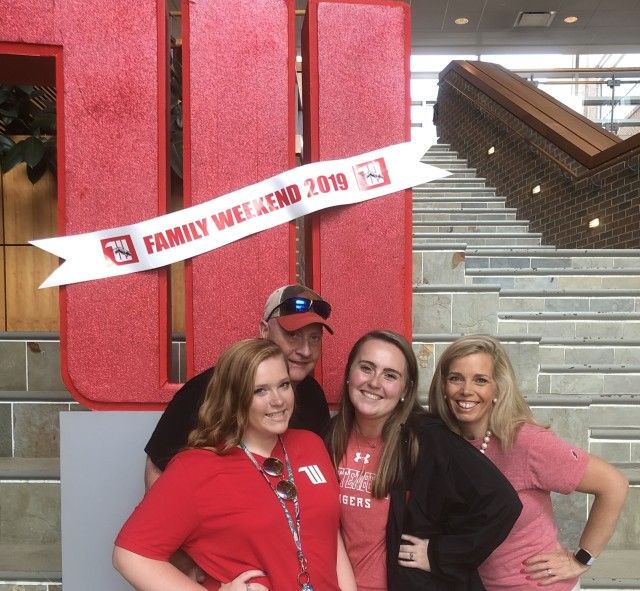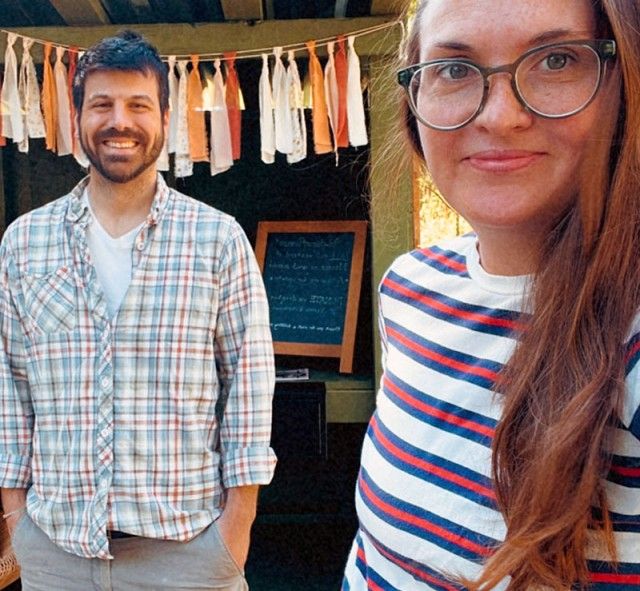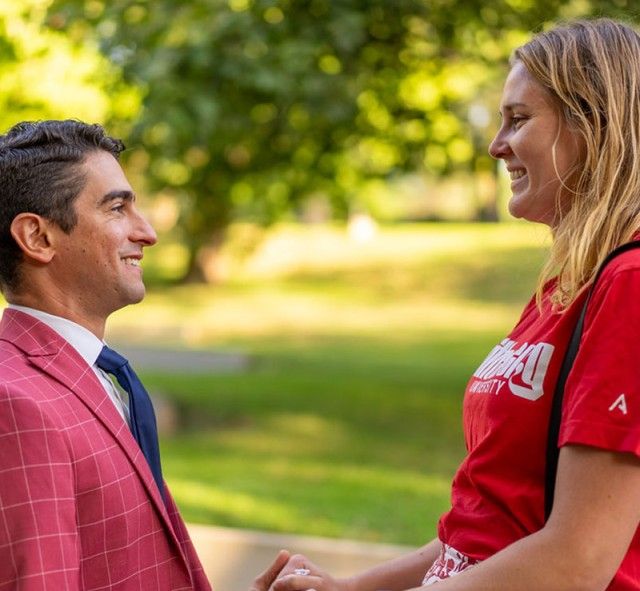A glimpse of Saturn through the lens of Wittenberg’s Weaver Observatory telescope became a pivotal moment for Chris Hartenstine, Wittenberg class of 2003. It was during a special viewing session hosted by the University’s award-winning astronomer-in-residence, Dan Fleisch, professor emeritus of physics. Even though Hartenstine could only see a quarter inch of the planet across the lens, it struck a passion in the young education major, one that would lead him to a career at NASA.
“I loved space, had a solar system mobile in my room and all, but looking at Saturn through the Weaver Observatory telescope just hit me and struck me with a moment of passion for space and space science. It was an epiphany and became a favorite thing for me to teach,” said Hartenstine, who graduated from Wittenberg with a focus in middle grades science and mathematics education.
Hartenstine said that Wittenberg prepared him for his career in many ways.
 “The smaller size of the campus allowed me to be involved in more things; it’s hard to make an impact at schools with larger campuses,” said Hartenstine, who was a member of the Weaver Chapel Association, WUSEA, and Union Board. His position with Union Board as technical director with responsibilities of audio and staging needs, ties directly into what he does now at NASA.
“The smaller size of the campus allowed me to be involved in more things; it’s hard to make an impact at schools with larger campuses,” said Hartenstine, who was a member of the Weaver Chapel Association, WUSEA, and Union Board. His position with Union Board as technical director with responsibilities of audio and staging needs, ties directly into what he does now at NASA.
“I was looking to go somewhere out of town, and Wittenberg was the first school to be in my mailbox,” he added. “Additionally, my interest was in education. Pennsylvania licensure was lined up for K thru 6 or 7 thru 12. Wittenberg and Ohio had the option of the middle grades and that’s where I wanted to be. Then, I did an overnight visit, and it was fantastic. It didn’t take me long to decide. Wittenberg showed me how to make education inspiring, and the plan the college had in place allowed for on-site learning and got me in the classroom early. By the time I did my student teaching, I was already ready to start. Witt did that for me – they provided me with the confidence and experience to be in the classroom, and I was ready. Going from college to the classroom was a very easy transition.”
Originally from Manheim, Pennsylvania, he went on to earn his Master of Education in curriculum and instruction with a specialization in educational technology from Cleveland State University. He also married Janet Barrows Hartenstine, Wittenberg class of 2005. The couple soon stretched their wings with a move to the Cleveland area where he taught at Cleveland Heights for a few years. And while he was happy as a teacher, he couldn’t resist the temptation to answer an ad in the Spring of 2007.
“I came across an ad looking for math and science teachers to work at NASA,” he said. “I said to myself, ‘this is NASA, they want certain teachers, there is no way.’ But Janet said if you don’t apply, you will regret it the rest of your life. So I overnighted my resume. And I actually got a call back! It was very much a surprise. I was not expecting to get the call back.”
Hartenstine is now the public engagement team lead and exhibits manager for NASA’s Glenn Research Center, in Cleveland, Ohio. In this role, he leads a team that communicates the value of NASA's missions and research to audiences of all ages. With 20 years of outreach and education experience, including three years in his current position, 13 years coordinating NASA Education projects, and four years serving as a middle school teacher in urban public and private schools, he has presented at museums, science centers, and major events in Cleveland, Columbus, Chicago, Detroit, Indianapolis, New York, and Orlando, as well as in schools across New England and the Midwest.
And since the day he drove onto the research site for his first interview, the Glenn Research Center has never lost its allure for the now North Olmsted, Ohio, resident, and father of two.
“You roll up and see the NASA Glenn Hangar looming right there; it’s an impressive moment on day one, and it’s never lost its allure,” Hartenstine said. “It was a big change going from the education side — teaching those under the age of 18 – to the other side, the outreach side – where the reach is ages 0 to 99. However, the eyes of amazement haven’t changed. Through NASA engagements, I’m still sparking interest in math and science. I’ve always wanted to inspire everyone to have more of an interest in math and science, and to be doing it at NASA is incredible.”
Even more exciting right now for Hartenstine is the upcoming total solar eclipse on April 8, dubbed the Great North American Eclipse by some media. While Springfield, Ohio, will have a front-row seat to the total eclipse, he will be leading NASA's efforts to educate viewers on how to safely observe the sun and highlight the importance of this once-in-a-lifetime event. And like Springfield, NASA's Glenn Research Center in Cleveland is the only NASA center in the path of totality. Thanks to his background in education and outreach experience, Hartenstine is the center’s solar eclipse subject matter expert.
“The fact that it’s going on right over our heads will be an intangible moment that you don’t realize until it’s gone,” he said. “When looking over the content a few years ago, I thought this was going to be cool, but didn’t have any idea what was in store for us all. Knowing ahead of time what you might experience is helpful – all the scientific and sensory things that will happen at the moment like the shadows on the ground, temperature changes, and the effects it will have on animals and insects – you will only have less than four minutes to take it all in, then it’s gone for good. Those are the opportunities we are trying to get people geared up for, so they know what they are looking for before the event.”
To prepare for the 2017 eclipse across the United States, NASA asked Hartenstine to create an interactive engagement to demonstrate the science behind the eclipse.
“In doing a little ‘market research’ with friends and people in the community, I quickly discovered that while most people thought eclipses were interesting, they really didn’t understand the scope of the phenomenon,” he said. “People in general didn’t know why eclipses happen, what made our Earth and moon uniquely positioned to have these amazing events, or what to expect during those few short minutes of totality. So, I created a to-go eclipse kit and trained various NASA employees how to use them.”
The kits were deployed to various eclipse events around Ohio, and he was invited to take one with the NASA team going to the big show – Jefferson City, Missouri, in the path of totality that year. Since NASA Glenn’s contributions to the agency are focused more on research and engineering rather than astronomy, there weren’t a lot of scientists available to field questions, so, according to Hartenstine, “I sort of ended up becoming the de facto resident expert on eclipses for the center.” He was also invited to attend the 2023 Annular Eclipse at the Balloon Fiesta in Albuquerque, New Mexico, and has done numerous newspaper, TV, and radio interviews surrounding the 2024 total solar eclipse coming through Ohio.
Hartenstine will be part of the festivities of the Total Eclipse Fest 2024 at the North Coast Harbor in downtown Cleveland from 10 a.m. to 5 p.m. daily, April 6-8. In a partnership between NASA’s Glenn Research Center, Great Lakes Science Center, and The Cleveland Orchestra, the three-day celestial celebration is free and open to the public. The outdoor, family-friendly science and arts festival will feature free concerts, performances, speakers, and hands-on science activities with community partners. NASA Village will feature NASA scientists, engineers, and educators who will provide engaging activities for audiences of all ages.
Sharing information with others is one of Hartenstine’s favorite parts of the job, and, for anyone interested in a career in public engagement, he offers some advice.








